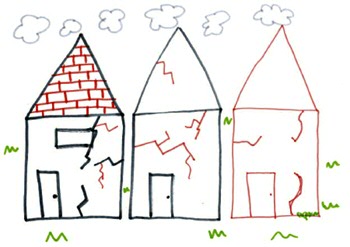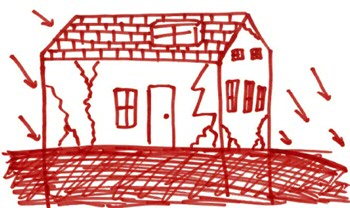Children speak out on serious earthquake problems: unsafety and mistrust
While one child thinks it is normal, another fears that their house may collapse, or distrusts the government because it ‘puts money before safety’. ‘A safe house, a safe home?’, a study by the University of Groningen (UG), Jonx and the UMCG, shows that serious earthquake problems in the Groningen gas extraction area can have various consequences for the well-being of children. But the study also shows that these children have lots of ideas about how to improve their situation.
Since 2016, the UG has been studying the sense of safety, health and prospects of inhabitants of Groningen on behalf of the National Coordinator Groningen under the name ‘Gronings Perspectief’ (Groningen’s perspective). A partial study, published today and carried out by the UG Department of Orthopedagogy, Jonx and the UMCG, investigated the experiences of 49 children and young people in the Groningen gas extraction area. Most of the interviewed children and young people lived in houses that had suffered severe damage. While it is unknown how often these consequences occur in the area as a whole, the study does present a vivid image of what it means for these children to grow up in this area. The children who participated in the study wrote letters and made drawings that have been published separately in a booklet.

Accustomed
Some of the interviewed children indicated that the gas extraction problems don’t bother them much. Personally, they haven’t suffered much damage to their houses or surroundings, and they have grown accustomed to the problems. They indicated that the gas extraction problems are normal to them and that they don’t know any better.
Distress, mourning and mistrust
The children who indicated that they are suffering from the earthquakes feel unsafe. They are afraid that the cracks will grow, that their houses will collapse or that an earthquake could have disastrous, fatal consequences. Some of them suffer from nightmares, bedwetting, concentration difficulties, anger and psychosomatic complaints such as stomach aches and headaches. Some of the interviewed children whose houses have been demolished are in mourning and feel homesick. A number of children also notice that their parents are affected by the gas extraction problems. These parents are sad, stressful and pay less attention to their children. In addition, children distrust the government and NAM (Nederlandse Aardoliemaatschappij, the Dutch oil company), believing that these organizations care less about people’s safety than about the financial costs involved.
Silence causes distress
Dr Elianne Zijlstra, assistant professor and main researcher at the UG, on the picture that the children paint: ‘While I had expected that some of the children would be suffering from the earthquakes, I had not expected the gas extraction problems to affect their lives so profoundly, nor for them to lose confidence in the government. Some of the parents find it difficult to talk to their children about the gas extraction. They believe that, by remaining silent about their concerns about the gas extraction problems, they won’t affect their children. But this silence can actually augment the children’s distress since children can sense that there are tensions. Therefore, it is important to include children in the discussion.’

Ask the children
'I just want the earthquakes to stop. I want our house to be safe, not to collapse and stuff.’ (A 10-year old)
During the interviews, the children offered many ideas about what they need and how to improve their situation. They want a safe childhood in their homes; gas extraction and the earthquakes to stop soon; fast, fair and generous damage repairs; sound information about the earthquakes; and a say in the discussions of problems as well as solutions. They also want Groningen to make the headlines in a more positive way, because Groningen has so much to offer and embodies so much more than gas extraction problems. Elianne Zijlstra: ‘You can say that the impact on children deserves more attention in policy-making on the gas extraction problems itself, in education and in care.’
More news
-
17 February 2026
From Ghostbuster to Disaster Researcher
-
03 February 2026
‘Such willpower’
-
20 January 2026
Alcohol, texting, and e-bikes
